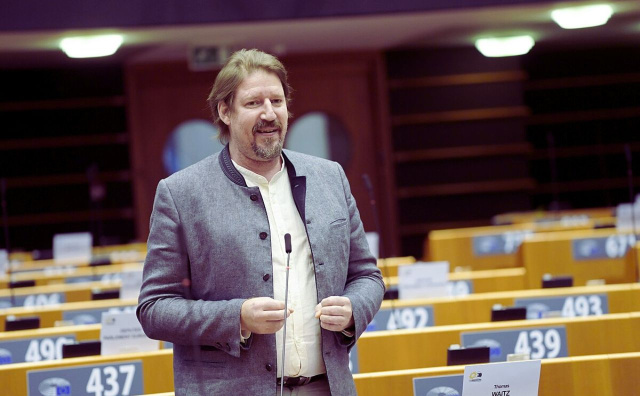Thomas Waitz, the European Parliament rapporteur on North Macedonia, has revealed that he received death threats in connection with his work on the country’s progress toward EU membership. In an interview with Kanal 5 TV, Waitz said threats continued even after the report was adopted by the European Parliament. He also spoke of coordinated pressure campaigns, including efforts by Bulgarian MEPs to remove him from his post and accusations that he was biased and corrupt. According to him, his personal phone number was shared in far-right Telegram groups, exacerbating the situation.
Waitz alleged that Bulgarian representatives in the European Parliament sought not just to discredit him, but to prevent any report on North Macedonia from being adopted at all. He described this as their ultimate goal – an attempt to block the process rather than engage constructively.
Despite the controversy, Waitz emphasized that the report on North Macedonia’s progress in EU integration should not be used to justify delays to the country’s constitutional amendments. He reiterated that these changes are part of a binding agreement with the European Union and that implementing them would immediately trigger the start of accession negotiations. He also expressed hope that the government in Skopje would meet its obligations, noting that many citizens in North Macedonia want to see their country join the EU.
Asked why references to North Macedonia’s language and identity were included in the report – despite such topics usually being outside the scope of EP documents – Waitz responded that it was necessary due to the specific political pressures coming from Bulgaria. He said Bulgarian politicians, officials, and MEPs had all raised objections on the issue, forcing its inclusion.
Waitz pointed out that four major political groups in the European Parliament – the European People’s Party (EPP), Socialists and Democrats, Renew Europe, and the Greens – had submitted separate amendments advocating for recognition of North Macedonia’s identity and language. As rapporteur, he supported their positions and even submitted his own amendment to that effect.
However, he noted that the EPP later withdrew support for the report, despite the fact that its contents had been agreed upon by multiple political families, including the Conservatives and the newly formed Patriots for Europe group. Their last-minute shift prompted Waitz to call for a postponement of the vote in the Foreign Affairs Committee, hoping a compromise could be reached.
He also attempted to ease tensions by introducing an additional amendment, clarifying that the recognition of North Macedonia’s language and identity was based on current realities and not linked to historical interpretations. While this proposal garnered 220 votes, it fell short of the required threshold and was not adopted. According to Waitz, this was largely because the EPP and the Socialists voted against it.
The final report on North Macedonia’s EU path was adopted in plenary with 461 votes in favor, 121 against, and 107 abstentions. The text includes what have been called “Bulgarian amendments” on language and identity, which were introduced by the EPP following earlier disputes.
